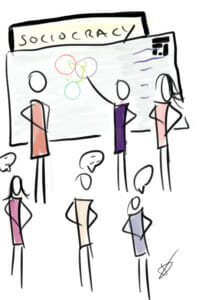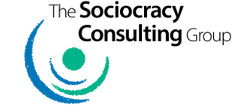
Our methods value effectiveness, transparency and the input of every member.
The Sociocratic Circle-organization Method (SCM), a system for organizing work and making decisions to guide that work, is foundational to our design-based approach.
We start from understanding that all members of an organization are part of leading that organization.
Instead of focusing on a few individuals previously identified as ‘leaders’, we help create teams that lead themselves effectively in accomplishing their goals.
An organization is agile when it commits to responsive structures and processes.
We need to make explicit changes in how we behave when we work together, and how we structure our organizations. Otherwise, outcomes will be based on some combination of default behavior, magical thinking, personal preferences, and implicit power dynamics. That is, nothing really changes.
A linear decision structure cannot provide the agility contemporary organizations need.
Living systems benefit from transparency, equivalence, and multi-directional feedback. When conditions change, they can adapt and thrive. By increasing feedback, equivalence, and transparency in human organizations, we increase adaptability and agility.
It’s easier to work as a team when you set your goals collaboratively.
Team members supporting each other in meeting commitments they’ve made themselves is far more effective than a manager imposing requirements.
It’s easier to be a team manager when you have the consent of the team to manage them.
Few people respond positively to arbitrary authority. When a team is part of deciding who fills a management role, they empower everyone involved – especially the manager.
Employees who set policies to guide their work engage more deeply with that work. Merely having input to decisions that someone else makes can be worse than having no input. When people own the decisions, they increase their engagement, invest in the outcome, and grow their critical thinking and collective leadership skills.
Meetings don’t have to be a frustrating waste of time.
It’s possible to consistently have meetings where people speak candidly, rather than saying what they think others want to hear. Meetings where everyone has a chance to speak, rather than a few people doing all the talking. The result? Creative and collaborative solutions emerge, rather than people fighting over polarized positions.
Don’t burn time and money on “leadership training.” Change your paradigm instead.
Expecting ‘leaders’ to change without changing the system they’re in has very low odds of success. Asking employees to engage more and contribute more when the organization doesn’t change is guaranteed to backfire.
See our Basics of Sociocracy page for a brief introduction to the foundations of the Sociocratic Circle-organization Method.
